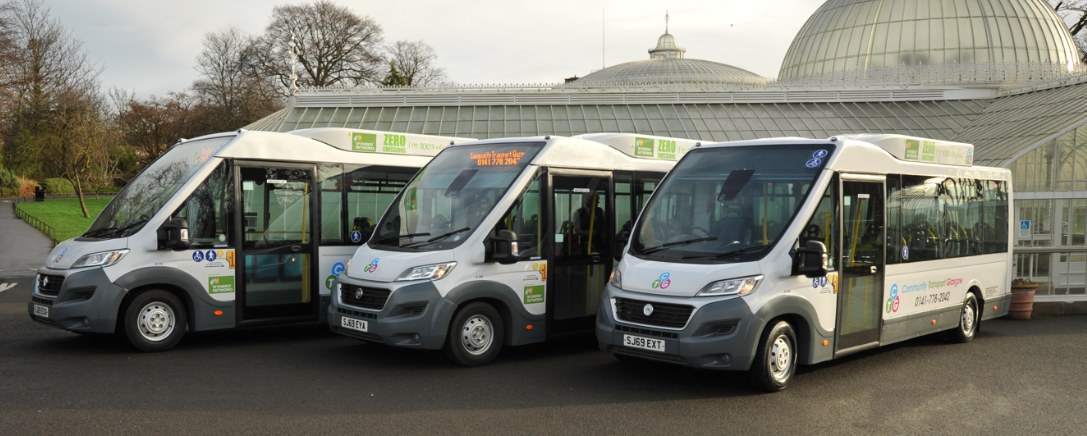
Reforming Network Support Grant
Network Support Grant (NSG) is essential funding for Scotland's Community Transport sector.
More than 1 in 3 Community Transport operators here claim NSG, the successor to the Bus Services Operators' Grant (BSOG).
According to Transport Scotland, NSG is a 'discretionary grant available to both commercial and community bus operators to support Scotland’s bus network and keep fares more affordable than would otherwise be the case'.
Keeping Community Transport Alive
It enables Community Transport operators to subsidise services for their passengers; tackle transport poverty; plug gaps in our transport system, including a shrinking bus network; and, respond to unmet transport needs across the country.
Some operators are dependent on the NSG to deliver their services. Any regressive changes in the eligibility or scale of funding available would be a threat to our sector and potentially the survival of some groups.
NSG keeps Community Transport services alive which could not otherwise exist.
Reviewing NSG
There is an ongoing review of NSG by Transport Scotland to 'ensure it continues to provide value for money whilst we also progress other opportunities in collaboration with the bus sector to improve services’.
We believe this represents an opportunity to rethink, reform and improve NSG to ensure it is fair, flexible and fit for purpose to maximise the social, economic and environmental benefits for taxpayers and passengers.
We've been speaking with our members across Scotland to gather data, evidence and views about how this can be achieved, which we've now compiled into our own review of NSG to inform and influence the work of Transport Scotland.
Our Findings
One major issue relates to the Fair Work First conditionality which will be attached to NSG, like all public sector grants, from 1 April 2024. This will be challenging for some Community Transport operators to achieve in the short-term with some exceptions likely to be required.
14% of operators who currently pay at least the real Living Wage say they are unlikely to be able to afford to do so in 2024/25 (due to the increase to £12 per hour).
Fair Work and fair funding are inextricably linked. Community Transport operators’ ability to deliver Fair Work and pay all of their staff at least the real Living Wage is constrained by a lack of fair funding which covers these costs.
Our members also raised the ineligibility of smaller vehicles, which are an integral part of Scotland’s transport network, as a significant barrier.
Many Community Transport operators use smaller vehicles with fewer than 9 passenger seats to deliver essential transport services (especially in rural, remote and island communities and in accessible transport for disabled people). 59% of smaller vehicles deliver transport services which replace withdrawn bus services.
Yet they are denied funding through NSG, which is a mode-specific, bus-only grant. NSG currently incentivises the use of larger vehicles to deliver services when this is not necessary, which is less accessible, cost-effective, efficient and sustainable.
Meanwhile, some concerns about communication and administration were also noted. Some Community Transport operators have experienced significant delays in access to advice, correspondence and payments.
Our Recommendations
We've made a number of recommendations for change:
Deliver Fair Funding: Ensure NSG reflects the true (and changing) costs of delivering transport projects and services for operators; ensure Fair Work First is fully funded by public sector grants; and deliver annual inflation-based uplifts.
Extend Eligibility to Smaller Vehicles: Reform NSG based on passenger class rather than vehicle type to extend eligibility Community Transport services delivered with smaller vehicles with fewer than 9 passenger seats (like in England and Wales) to support more cost-effective, efficient delivery of more accessible, comfortable services; reduce carbon emissions; and preserve the rural transport network.
Rethink NSG’s Purpose: Ensure NSG evolves to keep pace with changes in our transport network to support more flexible modes (such as cars, MPVs and minibuses), and more innovative services (such as volunteer car schemes and DRT), in addition to traditional commercial and community bus routes.
Enhance Communication and Administration: Improve administration of NSG through direct and timely engagement with and clearer guidance for the Community Transport sector; the creation of a new phone line; and the creation of new customer service standards or service level agreements.
Next Steps
In December, we wrote to Fiona Hyslop MSP, the Minister for Transport, to highlight our findings and recommendations, as well as share a copy of our review. You can download our review here or read our letter to the Minister here.
We look forward to working with Transport Scotland to discuss next steps and to take forward our ideas for reform NSG, as we continue to stand up and speak out for our sector. If you'd like to share your own feedback about NSG, or any other funding issue, drop me a line at david.kelly@ctauk.org.
Update
As of July 2025, it has been confirmed that Community Transport operators utilising smaller vehicles with less than 9 passenger seats are now eligible for NSG. This positive step forward secures one of the key changes asked for in our 2024 review after campaigning by CTA and a legal review by Transport Scotland.
Section 19 permit holders with vehicles meeting the description of a public service vehicle are now eligible for NSG, including vehicles with less than 9 passenger seats, provided they charge separate fares. Operators can apply for NSG here.
